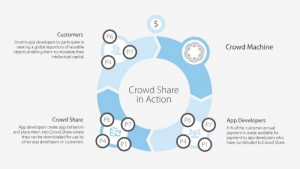
“The growth of the production blockchain ecosystem is slow because traditional development approaches don’t enable applications to be built at a pace that meets market demand,” said Craig Sproule, CEO of Crowd Machine. “The ICO market is awash with white papers promising applications to be delivered in unachievable timeframes. Crowd Machine delivers the technology to allow those promises to be met.”

Crowd Machine
Crowd Machine offers:
- a full developer stack
- scalable computation
- file storage
- external data
- monetization
- payments (for the creation of decentralized applications of the future).
With these components in place decentralized apps can emerge and grow. Metavine believes it enhances Crowd Machine because decentralized apps can be built on top of any blockchain. Supported by a zero-code environment, it argues ‘anyone can build an app’.
Essential components of Crowd Machine
Three essential components form Crowd Machine:
- the Crowd Computer: this is a global decentralized app execution engine designed to execute blockchain smart contracts and decentralized apps. A peer-to-peer network of crowd virtual machines run on peer devices, with owners compensated for the use of their surplus processing power
- the Crowd App Studio: this makes it up to 45x faster and cheaper to build traditional and blockchain apps with no-code
- Crowd Share: this enables the developer community to contribute source code to a common repository; each time source code executes on the Crowd Computer, the community member who contributed the code receives compensation.
Crowd Machine is a full-stack, decentralized app creation and execution technology. It is available to integrate with existing smart contracts and to extend the functionality of those contracts. It functions both on-chain and off-chain to deliver enterprise-relevant solutions.
How does Crowd Machine work
Crowd Machine consists of a decentralized, peer-to-peer network computer called the ‘Crowd Computer’ which ‘exists on the Crowd Machine community’s mobile devices and computers. Each device on the network functions to execute decentralized apps.
Built into the Crowd Computer is a blockchain-based, decentralized app builder technology called the Crowd App Studio. The Crowd App Studio enables developers (including novices) to build decentralized apps to run on the Crowd Computer. According to Metavine “Crowd App Studio is easy to use, functionally rich and enables the creation of decentralized apps to meet any requirement. Additionally, developers can create blockchain smart contracts to meet the most demanding requirements.”
The Crowd App Studio has access to Crowd Share. This is a library of reusable source code the community has created. Crowd Share speeds up decentralized app development even further. Community members can add source code to Crowd Share and receive a payment every time the code runs on the network.
Once a developer has built a decentralized app, he or she deploys this across the Crowd Computer. It is now available for customers. In effect, Crowd Machine enables developers to create off-chain apps that are blockchain agnostic.
What does it mean
Metavine claims several Fortune 500 companies have tested its technology. Named testers include General Electric, AON Hewitt, KONE, Anthem and Pacific Western Bank. The attraction is that developers – allegedly including novices – can build apps for free, making coding a thing of the past. Better still, if there is code re-use, there is a mechanism to reward creators. Thus Crowd Machine may present serious competition to building dApps on Solidity.
Thus far blockchain technology exists for the techno-cognoscenti. Either you know or exclusion applies. If Metavine delivers as it describes Crowd Machine, then a sea change in accessibility to blockchain-enabled apps could occur. While ET does not believe that any Tom, Dick or Harry will suddenly become blockchain cognisant, anything which broadens the base of understanding is welcome.

























